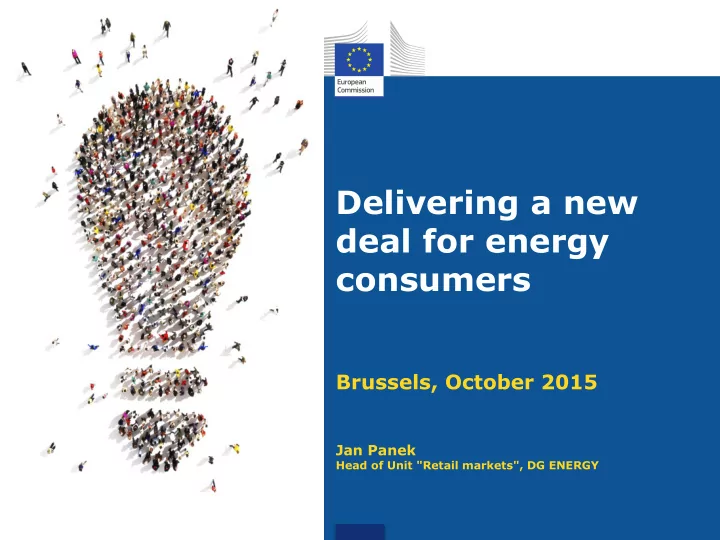

Delivering a new deal for energy consumers Brussels, October 2015 Jan Panek Head of Unit "Retail markets", DG ENERGY
Energy security, solidarity and trust Integrated European energy market Energy efficiency to moderate demand Decarbonisation of the economy Research, Innovation and Competitiveness 2
Summer Package Market Design Initiative "New Deal" for Energy Consumers including Best practices on energy self- consumption ETS reform Energy Labelling 3
Market design Communication – why? Previous legislative packages opened up markets • Competition/unbundling rules, removing barriers for newcomers • Regulatory oversight, harmonisation of technical rules, etc. Game changer: Intermittent generation • RES-share: from 26% to 50% • From central to decentral • From "base load" to variable • Active not passive consumers 4
Flexible, connected markets needed RES integration requires flexible markets Demand response alongside better interconnections contribute to flexibility Markets should encompass a broader range of players including on the demand side 5
New deal for Consumers – why? Falling wholesale prices… …but rising retail prices. 6 Source: Directorate-General for Energy Source: Directorate-General for Energy
Customer satisfaction below average Electricity Postal services Gas Mortgages DG SANCO Consumer Scoreboard 2014 7 Source: Directorate-General for Energy Source: Directorate-General for Energy
Energy poverty Energy
New deal for consumers - Context Energy Union " with citizens at its core, where citizens take ownership of the energy transition, benefit from new technologies to reduce their bills, [and] participate actively in the market " Key obstacles at present: Lack of info on costs & consumption • Limited transparency in offers • Impediments to self-generation/self-consumption • Low incentives for consumer action → poor competition • Increasing network charges, taxes and levies • Underdeveloped energy services and demand response • Slow uptake of advanced technologies and energy efficiency • 9 Source: Directorate-General for Energy Source: Directorate-General for Energy
Empowerment (1) I. Empowering consumers to act Better information on opportunities to save money frequent access to reliable information on consumption, costs – and type of energy source transparent, competitive and comparable offers – Rewards – Wider choice of action: – Simple, reliable switching – Demand response, self consumption (best practice) – Intermediaries, collective schemes/cooperatives 10 Source: Directorate-General for Energy Source: Directorate-General for Energy
Empowerment (2) I. Empowering consumers to act Updated consumer rights & protection – targeted protection of vulnerable (social policy/EE, price deregulation) – Collaboration of competent authorities (ucp) – Monitoring of energy poverty 11 Source: Directorate-General for Energy Source: Directorate-General for Energy
Smartness II. Smart homes and grids Enablers of energy transition, shift toward home • Fully interoperable smart home appliances and components • Access to fit-for-purpose smart metering systems • Research, innovation and industry for international • competitiveness Innovation-friendly, cost reflective, cost efficient and • transparent network operations 12 Source: Directorate-General for Energy Source: Directorate-General for Energy
6 Ways Smart Metering benefits consumers more accurate and frequent consumption data demonstrably Energy Savings help consumers reduce their consumption and save money more detailed consumption measurements help consumers Energy Efficiency identify opportunities for energy efficiency improvements smart meters are indispensable for smart home Innovative Services solutions/home automation, reducing energy costs Consumer switching suppliers, modifying contractual terms, etc. becomes easier, faster and cheaper Empowerment use of local renewable sources and storage potential (micro- Sustainability grids), electromobility become easier Distribution System management of the distribution systems becomes cheaper and more effective, leading to lower distribution costs Efficiency 13 Source: Directorate-General for Energy Source: Directorate-General for Energy
Smart Meters: Benchmarking CBAs & Roll-out Plans ELECTRICITY: 20 CBAs, 16 MS: wide roll-out ~ 72% EU consumers 195 million meters € 35 billion GAS 19 CBA, 7 MS: wide roll-out ~ 40 % EU consumers 45 million meters € 10 billion 14 Source: Directorate-General for Energy Source: Directorate-General for Energy
Smart Meters: Functionalities Key to Success Energy
Data III. Data management and protection Consumption and metering data 100% under consumer control • Guaranteeing privacy and data protection • Non-discriminatory, efficient handling of metering data to • promote innovation and competition Important: neutrality of data access managers • 16 Source: Directorate-General for Energy Source: Directorate-General for Energy
Ensuring Privacy by Data Protection & Security • Data Protection Impact Assessment (DPIA) template Data Protection • Data Protection Reform of Directive 95/46 • Identification of BATS for smart metering systems Cyber-Security • Trustworthy Network for experience sharing • Minimum Security Measures 17 Source: Directorate-General for Energy Source: Directorate-General for Energy
Thank you Energy
Recommend
More recommend